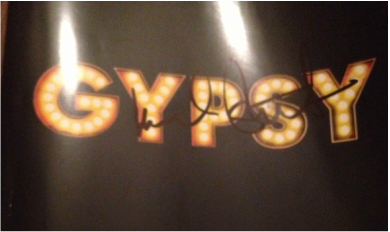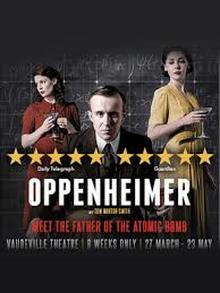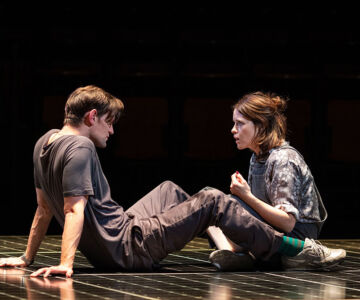 Everything's Coming Up Imelda! "Gypsy" is Finally Back in Londonby Randi / April 17, 2015
Everything's Coming Up Imelda! "Gypsy" is Finally Back in Londonby Randi / April 17, 2015We begin in Oppy’s (as his “friends” call him) house as his (repeatedly described non-monogamous) girlfriend hosts a drunken neurotic fundraiser for ‘the Spanish crisis’ in the early stages of World War II. Her agitated uneasy speeches show us 1) they’re all proud Communists and b) she, Jean, is quite mentally unstable. I wouldn’t want to be friends with these people. All pretentious in their highly educated status, showing how caring and cultured they are by getting drunk and dancing all night in the name of supporting the less fortunate who are being tortured, starved, and killed. It struck me as an ugly scene but extremely illustrative of this group of middle class people. I was told that Oppenheimer was famously hard to get along with, but instead of showing us that, we see that compared to his social circle he was the lovable puppy in the crowd, at least at the beginning. So that was a curious creative choice.
Things pick up from here, as Oppy gathers the finest minds in science (or at least northern California), then the military takes over as it does, and the whole shebang becomes the super secret Manhattan Project.
The military’s involvement/control is obviously a mixed blessing. They get resources, power, land, and uranium, but also lots of bullshit and awfulness. Any red-leaning brains (everyone we met in the beginning) get shipped off to war or to Alaska because Murka was awful afear’d back then of people who may have thought differently. The interference with (or, often, hindrance of) science in the name of democracy is an extremely frustrating and terrifying thing that the military enjoyed doing. Good thing the government lets science be now!
As more progress is made on the bomb, Oppy becomes more and more of a righteous jackass, as the weight of what he’s doing weighs on him. Or doesn’t. We hear a lot of big speeches about how Oppy is lead and ytterbium and iron, stable at the core, and that he carries the responsibility without it breaking him. I guess it was supposed to be an ironic statement of stability? or disaffectedness? Because obviously it broke or at least injured him. But that wasn’t clear. It was more of a disconnect between words and actions than it was irony. Like unintentional disjunction. (I’m looking at you, Mr. Director.)
A lot is said about how Oppy was chosen to lead the project because the military could control or at least predict his behavior. As they wanted, he broke off contact with his commie brother for a long time, he turned friends in to the inquisitors, he shipped off some of his best students to war and refused to help them when they returned. He got real jerky like. I mean, if you were spending the prime of your life devoted to ending others’ lives, you’d prob go dark like Emma’s doing right now on “Once Upon A Time” (best show ever??). but the repeated thesis that he was unbreakable (they alive, dammit!) and resilient came across more incorrect than poignant.
At least Oppy was played by a decent actor, John Heffernan. I thought he was pretty good and then when I recognized him from the new BBC series “Jonathan Strange & Mr. Norrell” (which I was lucky enough to see a sneak preview of recently because I’m so important in the London entertainment scene) my thoughts were confirmed because only the best people are in that show. But there was a lot of not-so-decent acting on display here. I have issues with mainstem West End shows lately, so this (it’s like an off-West End production) had more. Everyone seemed a slight notch below where they should have been, especially with their American accents. Say your freaking r’s! And every time anyone said the word ‘sir’ but with another word coming after it, it became ‘suh’ and just ugh come on. Also no one could say ‘apparently’ without it getting super loose in the vowels when in American the vowels need to be constricted. I feel like dialect coaches are not valued anymore.
Everything just seemed a little jumbled, likely due to direction. Funnily enough, at the beginning, I despised Oppy’s girlfriend Jean and his friend’s wife Charlotte with the weird New England WASP country club/faux Katherine Hepburn accent. But by the end, these two actresses, Catherine Steadman and Sandy Foster, were my favorites. I don’t know if they got better with more meaty scenes, if I got nicer, or if it was just the power of comparison working in their favor.
One person I did not like was Oppy’s wife Kitty, played by Thomasin Rand. Maybe because that name is ludicrous, but I couldn’t get a handle on her. I don’t know if you’re supposed to hate her of if you’re supposed to feel bad for her because her husband is so preoccupied and she’s always (always) pregnant (and drinking to the point of alcoholism and smoking like a chimney throughout), but I didn’t. Or maybe her hatefulness comes from her husband’s stated lack of ability to connect or form real bonds and she’s like I left that foppish but super polite British guy for this? (And yes we see the very awkward courtship between Oppy and Kitty as they have an affair, get pregnant, and then ask said British guy for a divorce. He, by the way, had the funniest accent in the whole play, which was odd because he’s the only one who gets to be his real nationality. It was like an American doing an over-the-top British accent but the actor was really British, so I loved it. I hope it was on purpose.)
Or maybe it’s because her husband may have been in love with another woman the whole time. His earlier love, Jean, was clearly always special to him and their deep connection seemed to have persisted until her unfortunate suicide. She was unable to deal with her chemically unbalanced mind and the FBI agents tapping her phone and sitting outside her house all day and night because of her political views and ties to Oppy. It was all very upsetting and tragic. After her death, we get more reason to despise Oppy and Kitty as they agree that suicide is extremely self-centered and that Jean was super selfish for killing herself. At least they agreed on something? I wonder how accurate this portrayal was, because that’s a big black mark to paint on a person’s character. Do not like.
I wonder how accurate all of it was, actually. If all of Oppy’s contacts were under government surveillance for their political views, if the general in charge was really somehow everywhere all the time and in every important science discussion, if the captain on the project talked in an exaggerated American accent like he was just pulled from the set of “A Few Good Men”, if one of Oppy’s protégés apparently learned his American accent from the aforementioned “Big Bang Theory” (he sounded exactly like Sheldon and was my fave part). One of my favorite characters was Edward Teller, the Hungarian scientist who created the hydrogen bomb, or ‘super’. In the show, he was pushing Oppy to focus on the super during WW2, which seemed early but was apparently accurate, despite no real work being done on it until after the war. Ben Allen, the actor playing Teller, was pretty funny at times and made Teller one of the most sympathetic characters onstage, which I’m not sure was the intent given that Teller in real life was kind of a lunatic. So I’m told, I don’t know.
The first act had a lot of good learning and commies and New Mexico and more commies and excitement and stuff. The second act, hoo boy, it kind of fell apart in ways you could not imagine. First of all, at 1.5 hours each act, the play was way too long for what they did with the time. Do shows not have editors anymore? Act II could easily be 30-40 minutes shorter. Here’s what they should do: First, cut the kid. When we are supposed to assume they’ve dropped the first bomb, a child climbs out of the sunroof of the bomb, which is on stage, and he GIVES A MONOLOGUE. A kid that we have not met before, just this random punk kid with THE WORST American accent who has a few ridiculously pretentious paragraphs to recite about life and death and ephemerality maybe and who knows what and of course he messed up a line. He had literally one job. CUT THAT. It was nonsense and it brought the show to a screeching halt and not only added nothing but significantly detracted from the impact. I almost screamed for them to get the hook.
Next, cut the really freaky deaky and out of place bongo-drum circle and drug-induced drunken rave that followed the first test run of the bomb that occurred UNDER THE BOMB ACTING AS A DISCO BALL. I kid you not. I’m sure this wackadoo scene may have worked in some incarnation of this play, but it was not the one I saw. You can’t have a straight serious play and then throw in one super trippy conceptual scene for shits and giggles. It was completely weird with every character giving mini pretentious monologues about, well, life and death and ephemerality and who knows what while the rest of the cast was waving their arms in prayer to the gods of explosions in the fire and doing tribal chants like they were in a goddamn regional production of “Hair” while on acid. For like 10 minutes, sandwiched between serious science and black & white scenes, we uncomfortably watched this rave while the actors said lines like “The sun shone brightly like a diamond.” Well that might be Rhianna but you get my point. Omg.
Then, cut the next false ending of big grand speeches (yes there are more) that are terribly written and unnatural in Oppy and Bob’s classroom. I REALLY didn’t need to hear that bit about the horse Bob saw in Hiroshima after the bomb dropped. It was really graphic and disturbing but without the slightest need for it. I really didn’t appreciate that. So many sentences in this back half of Act II no one would ever say in real life, like overly wordy high school English essay kind of writing, when you think you sound smart but it actually makes you sound dumber.
I was thinking, such an important story should have been done better. But, then I thought, wait, is it such an important story? It is necessary to know the guy who built the atomic bomb and what not, but is this section of his life story necessary? Do we need to know he was kind of a jerk and had shitty friends and was a shitty friend and suffered a lot? And if so, why? His brilliant mind helped us do massacring of a newfangled variety, which the world is thankful for in a grotesque way, but was he necessary? Even his wife asks the general at some point why they didn’t pick Einstein or another great scientist who could have done it. The answer in this show is that the leader of this project needed this project to be his career highlight, and the other big name scientists already had other significant achievements in their careers. Cool. A more interesting story would have continued to the government’s turning on him after the war and their awful investigation into his political views, kind of like how the British government turned on Alan Turing after the war after he freaking saved their lives those ungrateful ignorant assholes. God knows in three hours would could have covered all of that. But we didn’t really get to it, probably because of all the unnecessary speechifying. So there were some really interesting choices made in this play. I’m not sure they worked, but despite all the weirdness it was still pretty good. I just wish they had hired an editor.
AUDIENCE: CONGRATULATIONS, Oppenheimer audience! This was the first time in many years that I did not see a cell phone being used during the show. I mean, that is pretty remarkable. However, there was this awful young couple behind me who talked the entire time. And I mean the entire time. I regret not saying something at intermission but I feared them cutting my hair during Act II or something. I did give them the good old death stare a few times though. I am proud of that.





